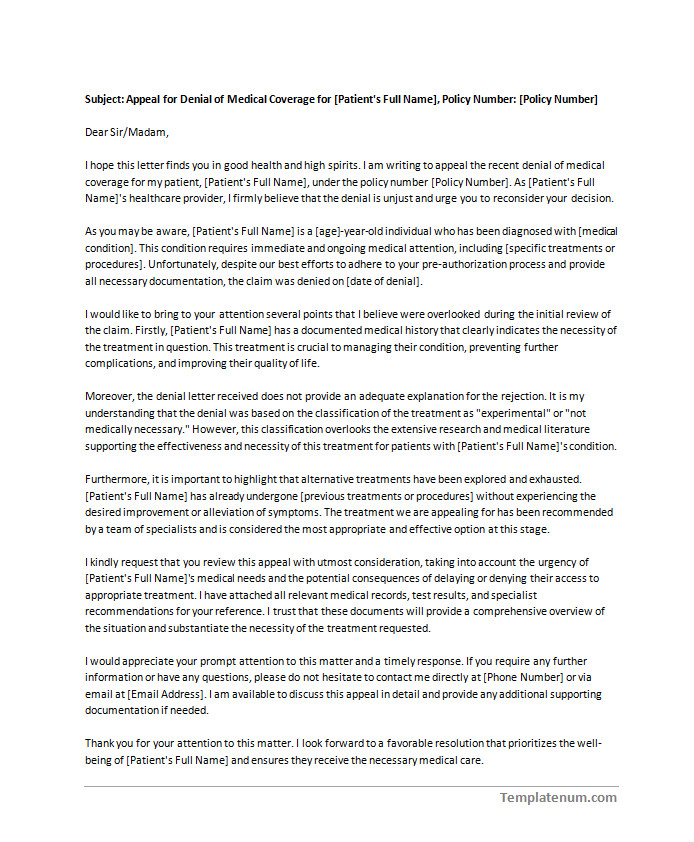
Dealing with medical issues can be overwhelming, especially when it comes to insurance coverage and reimbursement. If you’ve received a denial for a medical claim or treatment, you may feel frustrated and unsure of what to do next. This is where a medical appeal letter can be a powerful tool to advocate for yourself and challenge the denial decision.
What is a Medical Appeal Letter?
A medical appeal letter is a written document that you send to your insurance company or healthcare provider to request a review of a denied claim or treatment. It is a formal request to reconsider their decision and provide further explanation or clarification. The goal of a medical appeal letter is to persuade the recipient to reverse the denial and approve the claim or treatment.
Why Do You Need a Medical Appeal Letter?
Insurance companies and healthcare providers are not infallible, and mistakes can happen. Denials can occur due to various reasons, such as coding errors, lack of medical necessity documentation, or misinterpretation of policy terms. Writing a medical appeal letter gives you an opportunity to present your case in a clear and compelling manner, providing additional information and addressing any concerns that may have led to the denial.
When Should You Write a Medical Appeal Letter?
You should write a medical appeal letter as soon as possible after receiving a denial notice. Most insurance companies have specific deadlines for filing appeals, so it’s important to act promptly. Additionally, the sooner you address the denial, the more likely you are to have a successful outcome.
What to Include in a Medical Appeal Letter?
When writing a medical appeal letter, it’s crucial to include the following information:
- Your contact information: Provide your full name, address, phone number, and email address. This ensures that the recipient can easily reach you for any further correspondence.
- Date of denial: Clearly state the date you received the denial letter or notice.
- Claim or treatment details: Provide specific information about the denied claim or treatment, including the date of service, the healthcare provider’s name, and any relevant codes or descriptions.
- Reason for denial: Clearly explain the reason provided by the insurance company or healthcare provider for the denial.
- Supporting documentation: Include any additional documentation that supports your case, such as medical records, test results, or letters from healthcare professionals.
- Explanation and argument: Clearly and concisely explain why you believe the denial decision is incorrect or unjustified. Use factual information, medical evidence, and policy terms to support your argument.
- Request for reconsideration: Clearly state that you are requesting a review of the denial decision and ask for a prompt and fair reconsideration.
- Contact information of healthcare providers: Provide the contact information of any healthcare providers involved in the claim or treatment. This allows the insurance company or healthcare provider to reach out to them for additional information or clarification.
How to Write a Medical Appeal Letter?
Writing a medical appeal letter requires a structured approach to effectively convey your message. Follow these steps to write a compelling medical appeal letter:
- Start with a formal salutation: Address the letter to the appropriate person or department using their title and full name.
- Introduce yourself and state the purpose: Briefly introduce yourself, mention your policy or claim number, and clearly state that you are writing to appeal a denial decision.
- Provide context and background information: Explain the medical condition or treatment in question, including any relevant medical history or previous approvals.
- Present your argument and evidence: Clearly state why you believe the denial decision is incorrect or unjustified. Use specific examples, medical evidence, and policy terms to support your argument.
- Be concise and organized: Use clear and straightforward language, organize your points logically, and provide supporting documentation in a structured manner.
- Request for reconsideration and action: Clearly state that you are requesting a review of the denial decision and ask for a prompt and fair reconsideration. Specify any actions or steps you would like the recipient to take.
- End with a formal closing: Thank the recipient for their time and consideration, and provide your contact information for any further communication.
Mistakes to Avoid in a Medical Appeal Letter
- Emotional language: While it’s understandable to feel frustrated or upset, it’s important to maintain a professional and respectful tone throughout the letter. Avoid using emotional language or making personal attacks.
- Missing deadlines: Make sure to submit your medical appeal letter within the specified deadline. Missing the deadline may result in your appeal being dismissed.
- Insufficient evidence or documentation: Ensure that you include all relevant supporting documentation to strengthen your case. Lack of evidence or incomplete documentation can weaken your appeal.
- Unclear or disorganized arguments: Present your arguments in a clear and organized manner. Use headings, bullet points, and paragraphs to structure your letter and make it easier to read and understand.
- Failure to follow up: If you don’t receive a response within a reasonable timeframe, follow up with the insurance company or healthcare provider to ensure that your appeal is being processed.
Writing a medical appeal letter can be a daunting task, but it’s an essential step in advocating for yourself and ensuring that you receive the healthcare coverage and treatment you deserve. By following the guidelines outlined in this article and presenting a well-structured and persuasive case, you increase your chances of a successful appeal.
Download: Medical Appeal Letter Template